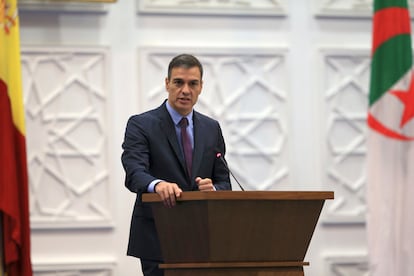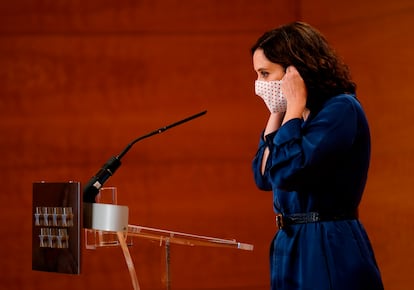Spain’s PM mulls state of alarm for the Madrid region
Pedro Sánchez said he would like to reach an agreement with regional authorities and assured that the latter’s powers will be respected

Spanish Prime Minister Pedro Sánchez is considering whether to declare a state of emergency in the Madrid region, after the regional High Court on Thursday ruled against authorizing mobility restrictions that were introduced by the central government against the wishes of Madrid authorities.
The court said that while it supported the need for measures, it rejected the legal framework used to apply them. The judges found that the mobility restrictions affected fundamental rights, and that any alteration of the same requires parliament-backed legislation.
Speaking from Algiers, where he was meeting with President Abdelmadjid Tebboune on Thursday, the Spanish leader said that his government “has always contemplated” the possibility of declaring a small-scale version in Madrid of the state of alarm that gave the government emergency powers to keep Spaniards confined to their homes between mid-March and mid-June.
But Sánchez added that he would like such a decision to be made with support from Madrid regional authorities. The latter have so far fought the central government’s initiatives to contain the spread of the coronavirus in a region that is once again the epicenter of the pandemic.
A legal and political battle over how to contain the virus while protecting the economy has been openly playing out between the central government, headed by a center-left coalition of the Socialist Party (PSOE) and Unidas Podemos, and the Madrid regional government, run by a center-right alliance of the Popular Party (PP) and Ciudadanos (Citizens), propped up by the far-right Vox.
Sánchez on Thursday said repeatedly that any decision that is made will respect the Madrid government’s powers and be taken in agreement with regional authorities. But if Madrid leaders reject the declaration of a state of alarm, the central executive will be facing a complex decision.
Confused citizens

Meanwhile, Madrid premier Isabel Díaz Ayuso on Thursday announced new measures that will be “sensible, fair and balanced” without providing details about the same. Regional government sources said that the measures will be published in the regional official gazette on Friday.
These sources suggested that regional authorities may want to go back to a system of restrictions based on basic health areas, which are administrative divisions smaller than a city district and which may contain one or more healthcare centers. The Madrid government recently introduced restrictions on 45 basic health areas in the region, but these restrictions were later superseded by the newer restrictions introduced by the central government, which confined entire municipalities – among them, the city of Madrid. That is, until the Madrid High Court on Thursday refused to provide legal backing for them.
Now, just ahead of a national holiday (October 12) that typically sees Madrileños leave town for a long weekend, residents have been left in the dark as to which, if any, restrictions currently apply. In the meantime, Madrid authorities are urging citizens not to leave town, despite the fact that nobody may be fined for doing so.
“We are asking Madrileños not to leave Madrid and to follow all health recommendations now that there is a long weekend,” said Díaz Ayuso after admitting that “nobody understands the rules. Citizens don’t know what’s going on.”
English version by Susana Urra.
Tu suscripción se está usando en otro dispositivo
¿Quieres añadir otro usuario a tu suscripción?
Si continúas leyendo en este dispositivo, no se podrá leer en el otro.
FlechaTu suscripción se está usando en otro dispositivo y solo puedes acceder a EL PAÍS desde un dispositivo a la vez.
Si quieres compartir tu cuenta, cambia tu suscripción a la modalidad Premium, así podrás añadir otro usuario. Cada uno accederá con su propia cuenta de email, lo que os permitirá personalizar vuestra experiencia en EL PAÍS.
¿Tienes una suscripción de empresa? Accede aquí para contratar más cuentas.
En el caso de no saber quién está usando tu cuenta, te recomendamos cambiar tu contraseña aquí.
Si decides continuar compartiendo tu cuenta, este mensaje se mostrará en tu dispositivo y en el de la otra persona que está usando tu cuenta de forma indefinida, afectando a tu experiencia de lectura. Puedes consultar aquí los términos y condiciones de la suscripción digital.








































